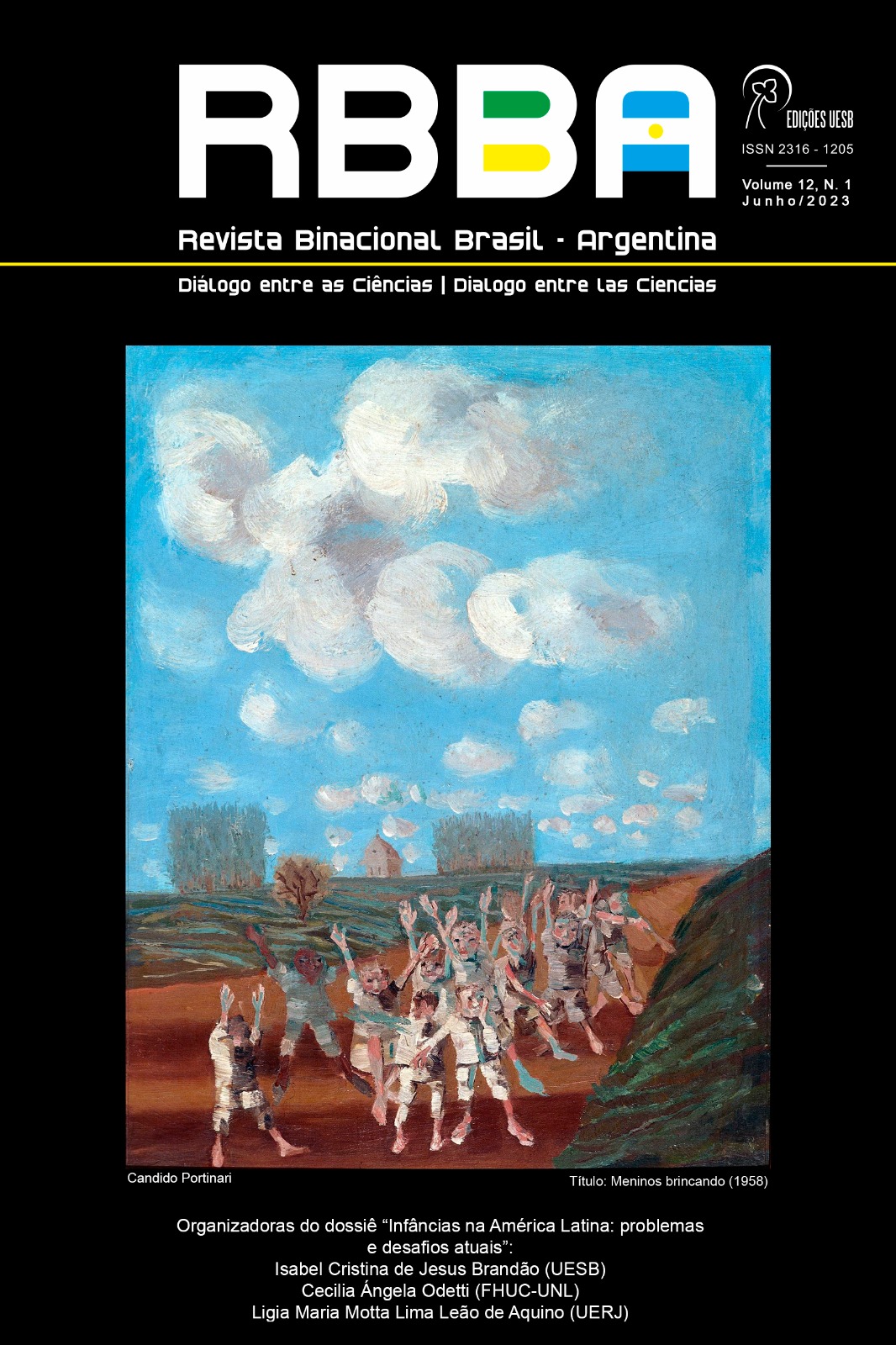CHILDREN AND FAMILIES IN TRANSNATIONAL MIGRATION: LATIN AMERICAN AND CARIBBEAN PERSPECTIVES
Keywords:
Childhood, Families, Transnational MigrationAbstract
The objective of this article is to analyze the migration of transnational children and families in the Latin American and Caribbean context. For this purpose, we collected demographic data from CEPAL² between 2010 and 2020, and articles from authors who research the subject. We verified that transnational migrations influence and impact family dynamics and children's subjective experiences. Age and gender issues appear in the increasing role of women, seeking better living conditions for their children, and in grandmothers who take care of grandchildren in the country of origin while women work in the destination country. The children who drive adult decision-making are agents in this process and in the destination country but participate little in the decision to migrate. Drawing from the Sociology of Childhood, we highlight that the place of migrant children is constructed from their experiences marked by social markers: race, class, gender, and country of origin. Accompanying their families on the journey, staying in the country of origin, or even being born in the destination country, children's experiences are crossed by adult migration, non-belonging, discrimination, racism, and xenophobia. It is noteworthy that migrations mark families even when some of them remain in the country of origin.
Downloads
References
ACOSTA GONZALEZ, E. Mujeres migrantes cuidadoras en flujos migratorios sur-sur y sur-norte: expectativas, experiencias y valoraciones. Polis, Santiago, v. 12, n. 35, p. 35-62, agosto 2013.
ALEXANDRE, I. J.; ABRAMOWICZ, A. Inserção escolar: crianças migrantes do Haiti nas creches e escolas de Sinop MT. Périplos: Revista De Estudos Sobre Migrações, v. 1, p. 184 - 197, 2017.
CONTRERAS, H. P. Feminización de las migraciones. Análisis interseccional y decolonial de los procesos de inclusión y exclusión social. Políticas públicas para la equidad social: v. 1, p. 199 - 208, 2018.
ARRIAGADA, I. Familias latinoamericanas: cambiantes, diversas y desiguales. Pap. poblac, Toluca, v. 13, n. 53, p. 9-22, sept. 2007
ARRIAGADA, I. Familias latinoamericanas: diagnóstico y políticas públicas en los inicios del nuevo siglo. CEPAL. v. 1; 55p. Políticas Sociales; 57. Santiago de Chile, 2001.
BAENINGER, R.; et al, Migrações Sul-Sul. Núcleo de Estudos de População Elza Berquó (NEPO) - UNICAMP, Campinas, 2018.
BRASIL, Ministério de Relações Exteriores. Comunidade Brasileira no Exterior - Estatísticas 2020, 2021.
CEPAL - Comisión Económica para America Latina y Caribe, 2020. CEPALSTAT. Base de Datos y Publicaciones Estadísticas, 2020.
CERRÓN, C. A.; WIESNER, R. M. L. Panorama de la migración internacional en México y Centroamérica. Editora CEPAL, junho de 2018.
CERRUTTI, M. S.; BINSTOCK, G. P. Familias latinoamericanas en transformación: desafíos y demandas para la acción pública. [s.l.] CEPAL, 2009.
ELIZALDE HEVIA, A.; THAYER CORREA, L. E.; CÓRDOVA RIVERA, M. G. Migraciones sur-sur: Paradojas globales y promesas locales. Polis (Santiago), v. 12, n. 35, p. 7–13, 1 ago. 2013.
PÉREZ GAÑÁN, R.; NEIRA MOLINA, A. Las abuelas de la migración. Cuidados, reciprocidad y relaciones de poder en la familia transnacional. Migraciones. Publicación del Instituto Universitario de Estudios sobre Migraciones, n. 41, p. 55–77, 1 jan. 1970.
GREGORIO, G. C., Migración Femenina: su impacto en las relaciones de gênero. Narcea Ediciones, España, 1998.
NEPO – Núcleo de Estudos de População “Elza Berquó”. UNICAMP. Banco Interativo Observatório das Migrações em São Paulo. Número da Imigração Internacional para o Brasil. Campinas, 2021.
OIM - Organización Internacional para las Migraciones, ONU. Informe sobre las Migraciones en el Mundo, 2020.
ORTIZ ALVAREZ, M. I., CEA HERRERA, M. E.; GONZALEZ SANCHEZ, J. Escenarios demográficos en América Latina y el Caribe. Invest. Geog, Ciudad de México, v.51, n.51, p.107-124, ago. 2003.
PAVEZ SOTO, I. Inmigración y racismo: experiencias de la niñez peruana en Santiago de Chile. Si Somos Americanos, v. 12, n. 1, p. 75–99, 1 jun. 2012.
PAVEZ-SOTO, I. La niñez en las migraciones globales: perspectivas teóricas para analizar su participación. Tla-melaua, Puebla, v.10, n.41, p.96-113, 2017.
PEDONE, C. Familias Transnacionales Ecuatorianas: estrategias productivas y reproductivas. In: BRETÓN, V.; GARCÍA, F.; JOVÉ, A.; VILALTA, M.J. (Org.). Ciudadanía y Exclusión: Ecuador y España frente al espejo. Madrid: Catarata, pp.251-278, 2007.
PEDONE, C.; ROMERO, A.B.; ARAUJO, G.S. Políticas Públicas, Migración y Familia. Una mirada desde el género. Nuevos retos en los estudios de género y migración en España, v.97, n.3, 2012.
PIZZARO, M.J.; RIVERA, O.C. Nuevas tendencias y dinámicas migratorias en América Latina y el Caribe. Población y Desarrollo, CEPAL, 2016.
Downloads
Published
How to Cite
Issue
Section
License
Copyright (c) 2023 Revista Binacional Brasil-Argentina: Dialogue between the sciences

This work is licensed under a Creative Commons Attribution 4.0 International License.






